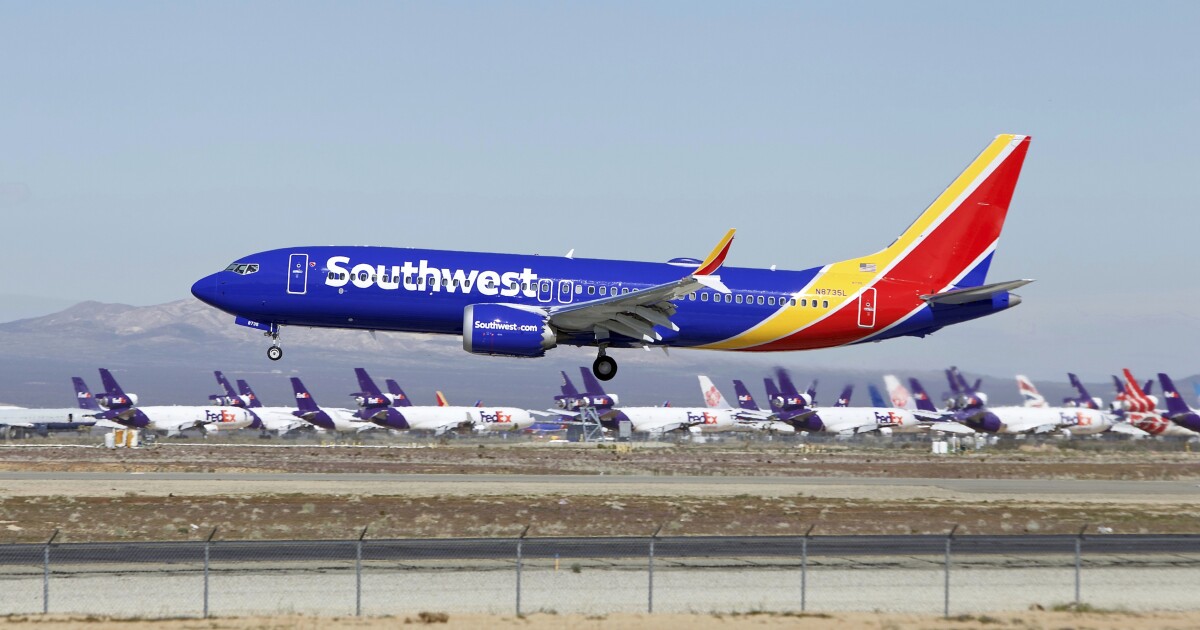The Texas Supreme Court on Friday agreed to hear Southwest Airlines pilots’ lawsuit against Boeing over the airline’s use of the global aircraft manufacturer’s defective 737 MAX, after rejecting the case in May.
Justices will decide whether federal transportation labor relations laws preclude the Southwest Airlines Pilots Association from suing Boeing over lost wages when the company grounded the 737 MAX in 2019 after hundreds of passengers and crew died in two crashes five months apart in Indonesia and Ethiopia.
The Fifth Court of Appeals in Dallas cleared the way for the union’s lawsuit to go through — a decision Boeing seeks to reverse.
“The court of appeals’ intervention into both federal and state policymaking authority makes this a paradigmatic and pressing case for this Court’s review and correction,” Boeing said in court filings.
It’s unclear why the Texas Supreme Court chose to review the case after rejecting Boeing’s request for review in May, which it did without explanation. No date has been set for oral argument yet.
Attorneys for Boeing did not respond to a request for comment. An attorney for SWAPA declined to comment on the record, and the association’s general counsel did not respond to a request for comment.
The Department of Justice found Boeing knowingly hid from the Federal Aviation Administration that a mechanism of the new 737 MAX could make the nose of the plane dip during low speeds — like during takeoff or landing — to ensure Boeing didn’t have to spend more money on pilot training for the new model.
The FAA found that the mechanism likely contributed to the two planes crashing shortly after takeoff.
Boeing and the DOJ are already negotiating a plea deal over the incidents, a version of which a Fort Worth federal district court judge rejected last month. The Dallas-based airline is involved because pilots who were members of the Southwest Airlines Pilots Association flew 737 MAX planes before Boeing grounded them.
In fact, SWAPA’s 2016 collective bargaining agreement with Southwest specifically stated pilots would fly the newer model, according to the union’s 2019 lawsuit. SWAPA accused Boeing of misrepresenting and omitting facts about the safety of the 737 MAX to pilots.
As a result, SWAPA claims pilots with Southwest — the largest operator of that model — lost millions of dollars in compensation after the plane was grounded and pilots’ flight schedules dwindled.
“Had SWAPA known the truth about the 737 MAX aircraft in 2016, it never would have approved the inclusion of the 737 MAX aircraft as a term in its CBA, and agreed to operate the aircraft for Southwest,” the pilots’ union wrote in its suit in Dallas County district court.
But Boeing argued the Railway Labor Act, which governs airline and railroad labor relations, prevents the union from making these claims in state court because it’s a federal issue.
Boeing says a central question is whether SWAPA’s 2006 collective bargaining agreement with Southwest already required pilots to fly 737 planes, including the MAX. If it did, Boeing says its alleged misrepresentation of the safety of the MAX wouldn’t matter.
Answering that question requires reexamining the 2006 and 2016 agreements, Boeing says. And since the RLA preempts legal claims that require a reexamination of a union’s collective bargaining agreement, SWAPA has no standing to bring its lawsuit.
“[T]he court of appeals diverged from every federal (and state) authority—including from the U.S. Supreme Court—to make Texas the only judicial forum in the country where parties may bring claims requiring interpretation of CBAs that are subject to the RLA,” Boeing said in court filings.
The union says the RLA only applies to labor relations between an airline and its labor unions, which doesn’t describe the relationship between Boeing and SWAPA. Plus, the union argues it’s not trying to compare the 2006 and 2016 agreements, but rather the money pilots earned versus what they could have earned had the 737 MAX not been deemed unsafe and grounded.
The lawsuit at hand is slightly different from a 2019 lawsuit over the same issue. In the earlier lawsuit, SWAPA sued on behalf of union pilots and the organization itself. The union argued it lost member dues and money spent on legal fees in connection with the DOJ’s investigation into Boeing.
SWAPA obtained the assigned right to sue on behalf of 8,794 of its members in the middle of that lawsuit, but the Fifth Court of Appeals ruled the union lacked standing to bring claims on behalf of its members and could possibly file another suit — resulting in the 2021 suit.
Boeing still argues the individual pilots, not SWAPA, must bring their claims against the company.
Got a tip? Email Toluwani Osibamowo at tosibamowo@kera.org. You can follow Toluwani on X @tosibamowo.
KERA News is made possible through the generosity of our members. If you find this reporting valuable, consider making a tax-deductible gift today. Thank you.

